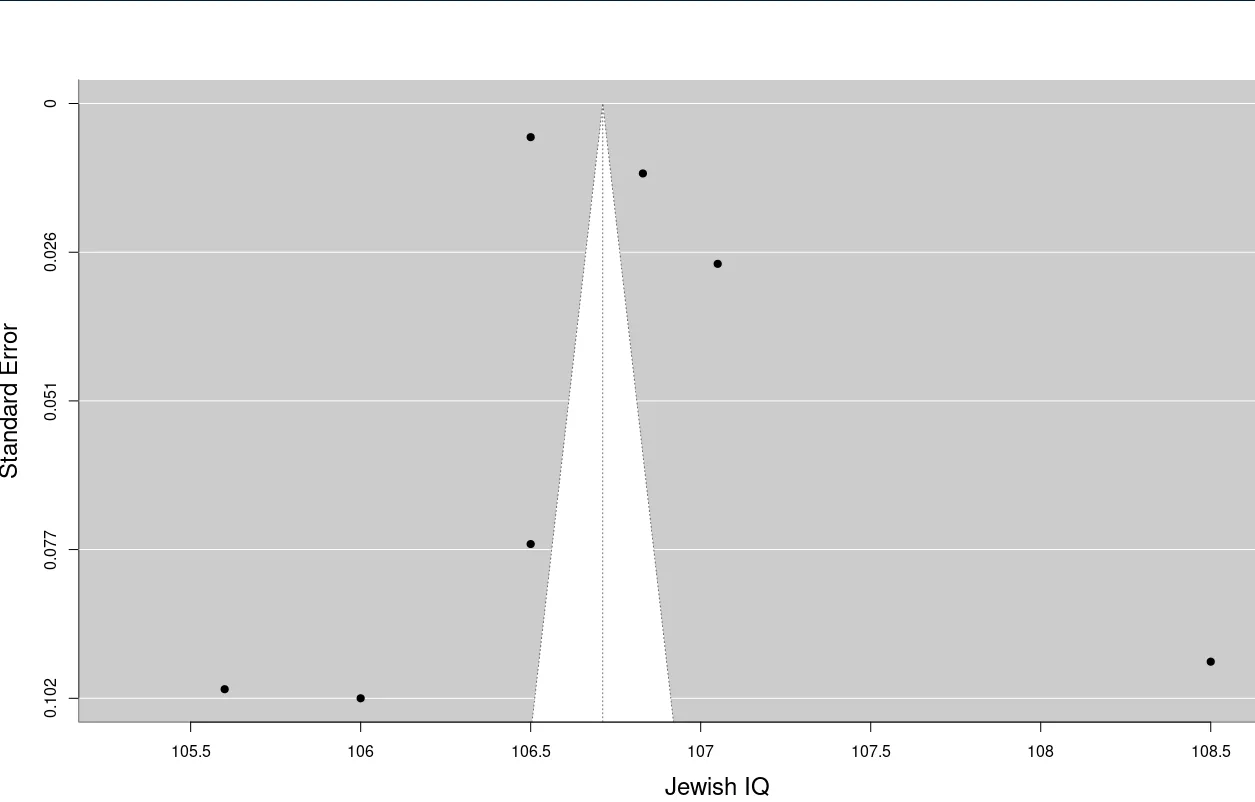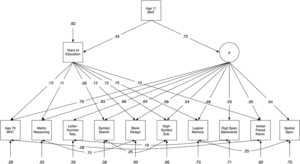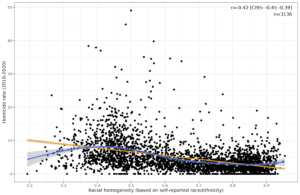Ah, yes, the perennial Jewish question. Historically, the Jewish question was what to do with the Jews from the perspective of those running countries: tolerate, integrate, convert, expel, or exterminate? In online circles, though, the more common Jewish question concerns the explanation for their success, broadly speaking: is it mainly human capital, or intelligence specifically (natural explanation, ‘winning fairly’), or is it mainly nepotism (group evolutionary strategy, ‘unfair winning’)? I think we can broadly say there are two clusters of people who are interested in this topic. The first cluster, which we might call the anti-Semites (they don’t object to this label in my experience), are the ones who notice Jews have a lot of power and use this in ways they don’t like. These are the people making meme compilations of Jewish bankers, Jewish communists, Jewish journalists, Jewish this and that. A lot of these are made up or full of errors, but they are not entirely wrong. They point to these lists and say Jews are clearly bad from their perspective. The second cluster are people interested in intelligence research. At some point, they discover the literature on group differences, including racial ones, and then they find writings by Charles Murray and Richard Lynn and others on Jewish intellectual achievements, and their high IQ scores. Both clusters are united, in some sense, against the blank slate default view or received opinion. However, there is occasional infighting. In fact, any time I mention anything about Jews on Twitter, a bunch of people from cluster 1 will show up. Sometimes they show up without me saying anything. Like this guy, rudimentary_logic:

It’s an apt display name considering that he was unable to figure out that the source he was citing as having 11 million people, is actually just the well known NLSY 1997, which has a sample size of about 9000. It’s a public dataset used for 100s of studies (you can download it too), so this information is widely known. It is doubly ironic that he complains that I used a small sample of Jews in the Wisconsin longitudinal study (WLS), which had 153 Jews, and says instead we should look at the “11 million” people study (Nyborg 2009), which had… 70 Jews:

The NLSY 1997 study was published by Danish intelligence researchers Helmuth Nyborg, a long-term friend of mine with whom I have published many studies. So it is amusing he thinks he knows better than me about this study.
However, to be fair to rudimentary_logic, the topic of Jewish intelligence is difficult for a number of reasons, so I think a summary of the data and why the question is difficult is worth writing.
What do you mean, Jewish?
Jews themselves have historically been a close-knit group that kept away from non-Jews romantically (endogamous). For this reason, obviously, they must have some kind of practical standard of who is Jewish and who is not. These are the various religious reasons you sometimes see references to, maternal descent etc. Scientifically, when we talk about The Jews, there are at least three senses in which one could mean a Jewish person:
- Someone who believes or lives according to the Jewish religion, Judaism
- Someone who self-identifies as Jewish
- Someone who has Jewish ancestry (genetics), which can be further broken down into paternal, maternal, or autosomal ancestry
Historically, these markers were almost in perfect agreement but in recent years have been statistically delinked. Most people are familiar with prominent cases of Jewish convertees, that is, people without Jewish ancestry who convert to Judaism (e.g. Ivanka Trump, who married the Jewish Jared Kushner), and historically there were many ethnic Jews who converted to Christianity. Given the high rates of atheism in modern populations, quite a lot of ethnic Jews are atheists and would not be identified in datasets that only ask about religion. Sometimes, survey questions aren’t really clear and just ask people if they identify as Jewish or not (“Are you Jewish?”), which could mean either of these two options — religion or ancestry — or even just people who feel Jewish, in the same way that some men feel they are women (‘trans-Jewism’).
If we look at one of the recent compilations of data on Jewish measured intelligence, the one here by Seb Jensen, we can get a sense of these issues. Here’s the values:

The studies all agree the IQ is higher than 100, but not exactly at what value it is. And they shouldn’t because some studies were published in the 1920s, and some were published in 2020s. These groups of Jews were not the same people. Some were recent non-English speaking migrants/refugees, others are 3+ generation English speaking American children whose mother said their religion was Judaism (ABCD dataset). After thinking about this for some years, I think these are the basic considerations to take into account when thinking about what values to expect regarding Jewish intelligence:
- In older datasets, Jewish self-identification, Jewish religion, and Jewish ancestry were approximately the same, very few ethnic Jews were atheists or convertees to other religions, and very few people had converted to Judaism.
- In older datasets, the Jews may not speak English (or the local language) natively and English-language tests may give very low values for reasons of language and cultural bias.
- There is a correlation between religiousness and intelligence of about -0.20 to -.40 (and this is also true for Judaism). Thus, the secular Jews are smarter than the religious Jews. If a study used newer data and identification based on religion, it will thus underestimate ethnic Jewish intelligence.
- Modern American Jewish population is mixed with non-Jewish European ancestry and increasingly East Asian as well (e.g. Mark Zuckerberg’s children). You can verify this easily by looking up typical Jewish surnames on 23andme’s surname search engine (e.g. Rosenberg is 55% Ashkenazi), which give you the average proportions of ancestry for American customers with a given surname. Thus, even studies that ask if people are ethnically Jewish will underestimate pure Jewish ethnic intelligence because of the non-Jewish ancestry (insofar as that ancestry has a lower mean, but note also that assortative mating for intelligence across racial lines will reduce this effect a bit).
So how can we overcome these problems? Well, it is fairly straight forward: you just measure Jewish ancestry using genetic data, and fit a regression model. This model will tell you what the expected IQ average is for a person with 100% Jewish ancestry. If one wants to be more precise and the dataset is large, and diverse enough, one can attempt to distinguish between the subtypes of Jewish ancestry, the elite Ashkenazis (German or European Jews), the merely high-performing Sephardics (Spanish Jews), and the also-ran Mizrahi (middle eastern Jews). Most of the focus has been on the Ashkenazis, since these have contributed the bulk of Jewish intellectuals, Nobel Prize winners and so on, and are also the most numerous (maybe 80% of Jews worldwide).
Right now, such an ancestry regression, or admixture analysis, study has not been done to my knowledge. However, we already know that the results will show an elevated score (higher than non-Jewish European) because we already have several studies that computed the average polygenic score for educational attainment or intelligence for Jewish samples. Take this 2021 study by Italian geneticist Davide Piffer:

The study is based on a a public dataset of frequencies of genetic variants by various ancestries or social racial classifications. One of these is Ashkenazi, which is based on a sample of about 15,000 Jews in the current version (v4), and about 1700 in the prior version (which I think the study above was based on):

So it’s extremely large, and the higher-than-European polygenic score is certainly not a matter of sampling error. It would have to be a bias in the score. It is hard to come up with a plausible such bias considering that Ashkenazi have about 50% ancient Levant (Semitic) ancestry, which has a lower polygenic score.
So to conclude, the current evidential situation regarding Jewish intelligence is as follows:
- Studies calculating Jewish IQ averages have a variety of known biases regarding use of self-identification, religious identification, or ethnic self-identification, and potentially biased tests that tend to result in underestimates of the average intelligence of the average person with 100% Jewish ancestry.
- Studies calculating polygenic scores for educational attainment or intelligence also find higher-than-European results for Jewish groups.
- No study so far has calculated ancestry proportions and estimated the mean IQ of those with 100% Jewish ancestry, but this is underway.
- It’s not clear to which degree Jewish achievement rates in the sciences, arts, politics etc. can be explained by their higher-than-European average intelligence, but certainly this is a large part of the explanation. Other factors include mental illness, Big Five personality, academic interest (side product of traditional Talmudic studies), and of course, ethnocentrism.

